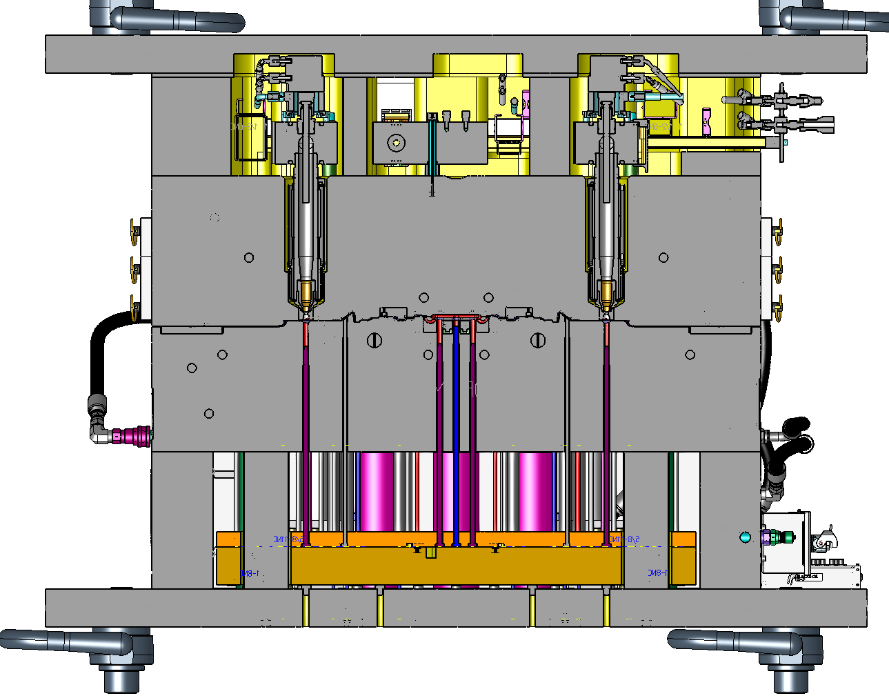Injection mold manufacturing plays a pivotal role in producing high-quality plastic components for various industries. While the focus is often on the final plastic pieces, it is equally important to emphasize the significance of quality control in the manufacturing process of the injection mold itself. By ensuring the precision and reliability of the mold, manufacturers can achieve consistent, defect-free production runs, ultimately leading to customer satisfaction and business success. In this blog post, we will explore the essential role of quality control in injection mold manufacturing and delve into the processes involved in maintaining mold integrity.
1. Understanding Injection Mold Manufacturing
Injection molding is a widely used manufacturing technique for producing intricate plastic components in large volumes. The process involves injecting molten plastic material into a specially designed mold, which determines the shape and features of the final product. Consequently, the quality and performance of the mold significantly impact the finished plastic pieces.
2. Importance of Quality Control in Injection Mold Manufacturing
a. Consistency and Precision: Quality control measures in injection mold manufacturing ensure the consistent production of precise plastic parts. Accurate dimensions, tight tolerances, and proper material flow are critical for achieving the desired functionality and fit of the final products. By thoroughly inspecting and testing molds during the manufacturing process, manufacturers can identify and rectify any deviations or defects promptly.
b. Minimizing Production Risks: Defective molds can lead to a range of issues, including production delays, part inconsistencies, and increased costs. Quality control practices help mitigate these risks by detecting and resolving potential problems early on. By adhering to stringent quality standards, manufacturers can minimize scrap rates, optimize production efficiency, and deliver high-quality products to their customers.
c. Longevity and Durability: Injection molds are subjected to high pressures, temperatures, and repetitive cycles during the molding process. Ensuring the mold’s durability and longevity is crucial to maintaining consistent production over extended periods. Through rigorous quality control, manufacturers can identify and address issues such as wear, fatigue, and stress concentration, thereby extending the mold’s lifespan and minimizing downtime.
d. Cost Savings: Quality control measures contribute to cost savings in injection mold manufacturing. Detecting and correcting issues during the mold manufacturing process is more cost-effective than discovering and rectifying problems during production runs. By investing in quality control upfront, manufacturers can reduce material waste, minimize rework, and avoid expensive tooling modifications or replacements.
3. Quality Control Processes in Injection Mold Manufacturing
a. Design Verification: The quality control process begins with design verification, where the mold design is thoroughly examined for manufacturability and functionality. This stage ensures that the mold can accommodate the desired features, gating systems, and part ejection mechanisms accurately.
b. Material Inspection: Raw materials used in mold manufacturing must undergo rigorous quality checks to ensure consistency, purity, and appropriate mechanical properties. Material inspections involve testing for factors such as melt flow index, chemical composition, and thermal stability to ensure the mold performs optimally.
c. Machining and Fabrication Checks: Throughout the machining and fabrication processes, quality control inspections are conducted to verify dimensional accuracy, surface finish, and adherence to design specifications. This includes meticulous checks on critical features, core/cavity alignment, and cooling channel design to prevent potential defects.
d. Mold Trials and Testing: Before production, mold trials are conducted to verify the functionality and performance of the injection mold. This includes testing for proper material flow, uniform cooling, balanced filling, and accurate part ejection. Comprehensive mold trials help identify and resolve any issues before commencing full-scale production.
e. In-process Inspections: Regular inspections and measurements are conducted during the mold manufacturing process to ensure each step meets quality standards. This includes inspections of mold inserts, cores, cavities, and other critical components to detect any anomalies or deviations that could impact mold performance.
f. Post-production Evaluation: Once the mold is complete, a final evaluation is conducted to verify its overall quality and performance. This includes comprehensive inspections, dimensional checks, and testing with various plastic materials to ensure the mold’s reliability and compatibility for the intended production runs.
The injection mold is the backbone of plastic component manufacturing, and the importance of quality control in the mold manufacturing process cannot be overstated. By prioritizing precision, consistency, and durability, Circle 5 produces defect-free molds that yield high-quality plastic pieces consistently. Implementing stringent quality control measures throughout the manufacturing process not only minimizes production risks and costs but also contributes to customer satisfaction, fostering long-term success for both the manufacturers and their clients in various industries.




